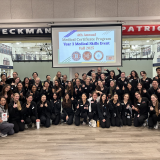Are we fractal, too? David Pincus explains
August 1, 2014
If you tuned into to
WAMC
Northeast Public Radio this morning, you might have heard the voice of associate professor of psychology
Dr. David Pincus
. He was featured on today’s
Academic Minute
talking about his
research on human resilience
and how our family and group dynamics follow fractal patterns often observed in Mother Nature.
You can listen to Dr. Pincus’
Academic Minute
or read the transcript below.
Transcript of Pincus’ Academic Minute
It’s easy to tell what is human versus nature made. Just look out the window.
Humans build in straight lines. Mother Nature works in fractals. Fractals are complex self-similar structures. Branching fractal structures include trees, neurons, galaxies and even the internet. Fractal timing patterns include heart beats, earthquake sizes, and stop times in traffic jams.
Indeed, it seems we are fractal too. Starting with family and group dynamics, we’ve found repeated cycles of verbal turn-taking that are shaped like a fractal – with exponentially more small recurrence events compared to large ones, just like the small and large branches on a tree. We’ve found that the size of these fractal branches reveal the power, closeness, and conflict among group members.
Flexibility in these fractal structures seems to be a sign of relational health, and the ability to shift from rigidity back to flexibility is a sign of social resilience – like a tree that can shrinks in winter and grows in spring. We’ve also found evidence that people naturally exchange fractal complexity in physiological arousal with one another, especially through empathy – “vibes” perhaps?
Fractals appear to underlie our habits, and also the structure of our egos.
The theoretical picture that is starting to emerge is that biopsychosocial systems are distributed complex networks, capable of shifting toward rigidity in response to stress, and “bouncing back” toward growth depending on our resilience – just like a good hammock or a net that carries our weight – ideally without getting stuck, warped, or torn apart. On the grandest scale – these fractal psychological processes show us that we are at home among the rivers, and rocks, the trees, clouds and the galaxies.
We are a part of nature’s world; she connects us; each of us is unique, and each carries her print.


